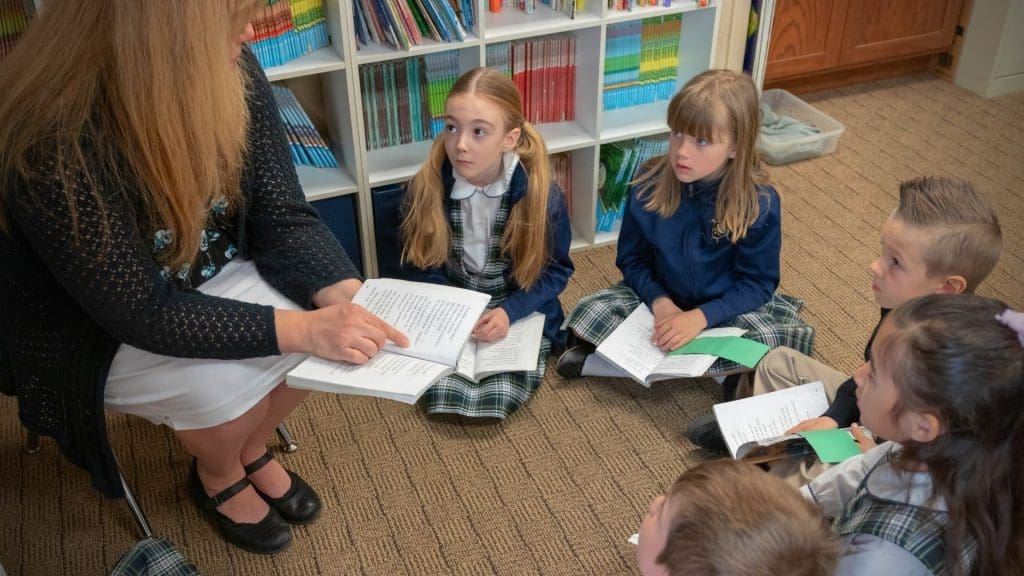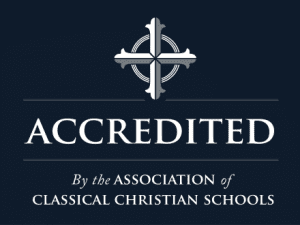God’s Perfect Plan

Why the the theme of God’s Perfect Plan is perfect for first grade.
Why Obedience?

Willing obedience to God is foundational to the Christian faith. Not just for 5 year olds, but for all of us.
What’s the Deal with 6th grade (and beyond) Tutorials?
In 6th grade, students begin regular tutorials with their homeroom teacher. What is a tutorial and why is it important? Carl Warmouth, Head of School, discusses tutorials with 6th grade teachers Hilary Dotters and Brian Tromburg.
Bold Showmanship and Humble Worship
by Carl Warmouth Dean of the Grammar School On December 20th, our students will take to the stage for what is arguably The Ambrose School’s highest level music and drama production: ‘The Gift of Christmas’ at the Morrison Center in Boise. From the venue, to the orchestra and choir performances, to the Greek theatre motif of call and chorus, to the technical aspects of television production, this year’s Christmas concert will be an incredible event. Lighting, beautiful clothing, carefully planned movements on and off the stage, video recording, editing and broadcasting – it’s amazing to think that these are our children pulling this off! And we make no apologies for expecting excellence from our students and staff, and for a night to celebrate Truth, Goodness and Beauty in a highly visible and complex way. But, “…as it is written, ‘Let the one who boasts, boast in the Lord.’” (1 Corinthians 1:31) We know from God’s word that “This is a trustworthy saying, and everyone should accept it: ‘Christ Jesus came into the world to save sinners.’” (1 Timothy 1:15) In the same way that each family experiences both “the hustle and bustle” of Christmas (shopping, cooking, parties, and events) and the quiet reflection of the birth of our savior, so we at Ambrose celebrate Christmas with both performance and quiet worship. As Temperance balances Fortitude, so must our hectic lives be tempered with being still before the Lord. We invite you to join us for a joint Grammar School/Upper School Exordium of Lessons and Carols on December 12th at 8:00 AM. This exordium is adapted from a traditional Christian worship service celebrating the birth of Jesus Christ. It is the story of the fall of man, the promise of the Messiah, and the birth of Jesus told through a series of Bible readings and songs. Following in this beautiful tradition, we have adapted this service for use at our school. The tone of this service will be one of quiet and worshipful reverence as we meditate on God’s plan of salvation at this most glorious time of year. Please mark your calendar and plan to join with us at 8:00 am on December 12th. The History of Lessons and Carols The original service, Festival of Nine Lessons and Carols dates back to 1880 when the Bishop of Truro, Edward Benson, formalized a service of nine readings from Genesis, the books of the Prophets, and the Gospels along with accompanying hymns. Benson would later become the Archbishop of Canterbury. Since that time, the original liturgy has been adapted for use by many churches of various denominations worldwide. The longest running and most popularly known version has been held at King’s College, Cambridge, UK, since Christmas Eve, 1918. The King’s College Festival of Nine Lessons and Carols has been broadcast annually by the BBC since 1928, except for a brief hiatus during the 1930’s.
Have you listened to the latest episode?
Bruce Flanagan spent four months in a prion in Hanoi after his humanitarian and ministry work nearly cost him his life. A few years later he was back as a businessman and gained influence and friends with leaders as high up as the prime minister. Five years ago, after he adopted two children he seriously had to rethink what he was doing and how he could best impact the next generation. His perspective on America and his recommendations for parents today is compelling and inspiring. Listen to Bruce Flanagan’s story “What I Learned in a Vietnam Prison About Raising the Next Generation.” Go to BaseCampLive.com to listen to every episode or subscribe through iTunes. If you’re a parent, pastor, youth leader, teacher, or administrator involved in raising the next generation, join us as we explore ways to shape children who can tackle the challenges they’ll encounter in today’s culture, and rise above to become flourishing adults who love Jesus Christ and who think with confidence, believe with courage, and serve with compassion.
Insights: Fighting Lions and Bears
A businessman battles against the heavy weight of failure after his business goes under. A teen feels abandoned and rejected after the divorce of his parents. A husband suffers through the unexpected loss of his wife. A man drives a delivery truck through a crowded street, killing dozens. Trials come to us all. Our response to them can either make us or break us: we can either grow from them, or they can be our undoing. As Christians, we are even exhorted to celebrate trials, knowing that God can use them to produce virtue in us. Part of our responsibility as parents and educators is to prepare our students to not just survive trials, but to thrive in them. To grow from them. Even to celebrate them. The truest fruits of our labor will not manifest themselves in high SAT scores or admissions to the best universities (though we get those) but when our students cling to Jesus as their Lord despite temptation from the world, when they remain faithful to their spouse in a difficult season in their marriage, or when they love the unlovable child. How do we strive towards such a noble goal? We ask our students to fight lions and bears. Here is what I mean: in 1 Samuel chapter 17, David arrives at the Israelite camp; the Philistines are camped across the way, and Goliath their champion has spent 40 days challenging any Israelite brave enough to face him to a winner take all, fight to the death; David, just a teenager at the time, volunteers to fight Goliath, and all the Israelites mock him; finally David is referred to King Saul, who tells him more the same: “You’re a teenage boy. He’s a professional soldier. You can’t possibly hope to beat him!” Note David’s response: “’[I] used to keep [my] father’s sheep, and when a lion or a bear came and took a lamb out of the flock, I went out after it and struck it, and delivered the lamb from its mouth…. Your servant has killed both lion and bear; and this uncircumcised Philistine will be like one of them, seeing he has defied the armies of the living God.’ Moreover David said, ‘The Lord, who delivered me from the paw of the lion and from the paw of the bear, He will deliver me from the hand of this Philistine.’” (1 Samuel 17:34-37) “Our natural inclination as parents and educators is often to try to make life easier, more comfortable, for our students, when in reality God is calling them to fight lions and bears.” David had a perfect confidence in God’s provision because he was in the business of fighting lions and bears. David knew that because God was faithful when he fought lions and bears, God would be faithful when he fought Goliath. And He was. Our natural inclination as parents and educators is often to try to make life easier, more comfortable, for our students, when in reality God is calling them to fight lions and bears. When our students go out in to the world and face their own Goliath, do not let it be the first fight they have been in. They need to be able to look back and see moments where they were pushed, where they were challenged, where they did the hard thing, and see God’s provision in their lives. They need to know that they can conquer any Goliath that life throws at them, because God has given them the victory before. It is true that at The Ambrose School students are required to do hard things. Reading Virgil as a sophomore is no easy task, but Virgil makes a great lion. Mr. Hosier and Mrs. Pauls will often expect more from students than they expect from themselves, but Chemistry and Precalculus make great bears. Our hope is that when students leave here and arrive on college campuses, in the workplace, or are confronted with difficult circumstances in life, they will have a perfect confidence in the provision of God because they first experienced it here. When faced with future trials, may our students say with confidence, “The Lord, who delivered me from the paw of Virgil and the paw of Chemistry, He will deliver me from the hand of this Goliath.”
Insights: Would the shared instruction model be a good fit for your family?
Would the shared instruction model be a good fit for your family? By Mandi Moore Shared Instruction Consultant at The Ambrose School and Board President at Cross Classical Academy, Brownwood, TX As our oldest child approached school age in 2009, my husband and I began to research educational options. Through much prayer and research, we became convinced that classical Christian education is the most effective option for instilling a love for God, truth, virtue, and learning into the lives of our children. To make classical education available for our children and other Christian families in our community, we helped launch Cross Classical Academy (CCA), a hybrid educational model in central Texas that blends the best of traditional classical Christian education with the best of parent-based learning. Our children attended classes on Mondays and Wednesdays and completed teacher-assigned lessons at home under my instruction and guidance on Tuesdays, Thursdays, and Fridays. Before attending CCA, I had often felt the time I had with my children passed so quickly that I was not completely accomplishing the goals I had for teaching and training them. The structure of our home days at Cross Classical enabled me to be intentional and effective with our family time. Dinner conversations were rich and meaningful as we discussed what we learned together each day. I became deeply acquainted with my children’s individual strengths and weaknesses. It was helpful to be able to provide extra instruction and practice when they struggled with concepts or content. Additionally, there was freedom to invest extra time and energy in the areas in which my kids enjoyed and excelled. When absences from school were necessary, I was able to easily teach any make-up work because I had all of the materials at home. “I had often felt the time I had with my children passed so quickly that I was not completely accomplishing the goals I had for teaching and training them.” Along the way, I had many opportunities to disciple my children as we worked through character issues that naturally arose on home days. We also had time to discuss their time spent on campus with friends and identify any areas for growth. The flexible schedule of our home days also allowed us to enjoy time with friends and family, as well as attend field trips during the week when exhibits were less crowded. I was blessed to be highly involved in the education of my children. The model supported and equipped our family by providing curriculum selection, daily lesson plans, student assessment and accountability, as well as parent training. Shared instruction model was a great fit for our family, as it is for many families around the country. Ambrose has a vision to make this hybrid educational model available to families in the Treasure Valley in fall of 2017. I am excited to be a part of the team launching the Bridge Program, which will blend the best of classical Christian education (2 days per week on campus) with parent-based learning (3 days at home). Please spread the word to your friends and family! OPEN HOUSE FEBRUARY 2ND & 23RD! Any parents interested in hearing more are invited to attend an informational meeting in the Ambrose library on February 2nd or 23rd at 7:00-8:00pm. Childcare available upon request. To RSVP or for questions, contact Bridge Program Director Melody Tracy at mtracy@theambroseschool.org. READ MORE ABOUT THE AMBROSE SCHOOL BRIDGE PROGRAM
INSIGHTS: Redirecting our Wheels: Being open to God’s leading, even when it’s a circuitous route
Recently in our 2nd grade class we discussed the Battle at Ai in which the Israelites fail in taking the city of Ai (because of sin in the camp), and then are victorious, with God’s direction and commands being obeyed this time. We fully discussed the unfortunate and final consequences that befell Achan AND his family when he chose to sin rather than to obey. As we were nearing the end of the story, with Joshua and the Israelites victorious in battle, we read of Joshua taking the Books of the Law out of the Ark of the Covenant, re-writing them, and reading them to the Israelites. I asked the students to think about this, having read through much of Genesis, Exodus, and a little Leviticus and Deuteronomy with them. We discussed how long this must have taken, and how tired Joshua might have been writing it out by hand, how many pages it must have been, even whether or not the Israelites had taken a bathroom break during its reading. I hadn’t planned to focus on this part of the story much at all! Yet, the students really wanted to contribute to the discussion, and we ended the story on a much different note than I had purposed. When we were done, I realized that while we didn’t focus much on the obvious point of the story (obedience), we were able to ruminate on different aspects of God’s leading (patience and faithfulness ) in the lives of the Israelites – possibly just as important. So many times we are intent on following a path we think God is leading us down – but along the way we are slowed down by the needs of others, by the detritus on the path, even by paths that seem to be taking us back to where we began. God is waiting for us to understand that even though His leading can wind around, taking us where we didn’t expect to go, or even don’t want to go, the journey, and what we learn along the way, is part of His plan. So when God redirects our wheels, we shouldn’t panic or balk – His timing, and His way, no matter how circuitous, is the path on which we should be. “Trust in the Lord with all your heart, and lean not on your own understanding. In all your ways acknowledge Him, and He shall direct your paths.” (Prov. 3:5-6)



